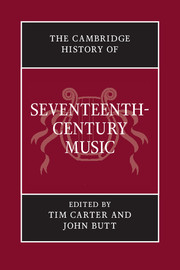Book contents
- Frontmatter
- 1 Renaissance, Mannerism, Baroque
- 2 The seventeenth-century musical ‘work’
- 3 Music in the market-place
- 4 Music in new worlds
- 5 Music and the arts
- 6 Music and the sciences
- 7 The search for musical meaning
- 8 Power and display: music in court theatre
- 9 Mask and illusion: Italian opera after 1637
- 10 The Church Triumphant: music in the liturgy
- 11 Devotion, piety and commemoration: sacred songs and oratorios
- 12 Image and eloquence: secular song
- 13 Fantasy and craft: the solo instrumentalist
- 14 Form and gesture: canzona, sonata and concerto
- Appendix I Chronology
- Appendix II Places and institutions
- Appendix III Personalia
- Index
- References
1 - Renaissance, Mannerism, Baroque
Published online by Cambridge University Press: 28 March 2008
- Frontmatter
- 1 Renaissance, Mannerism, Baroque
- 2 The seventeenth-century musical ‘work’
- 3 Music in the market-place
- 4 Music in new worlds
- 5 Music and the arts
- 6 Music and the sciences
- 7 The search for musical meaning
- 8 Power and display: music in court theatre
- 9 Mask and illusion: Italian opera after 1637
- 10 The Church Triumphant: music in the liturgy
- 11 Devotion, piety and commemoration: sacred songs and oratorios
- 12 Image and eloquence: secular song
- 13 Fantasy and craft: the solo instrumentalist
- 14 Form and gesture: canzona, sonata and concerto
- Appendix I Chronology
- Appendix II Places and institutions
- Appendix III Personalia
- Index
- References
Summary
It is in the nature of historians of Western art-music to divide their repertories by periods; it is also in the nature of music histories to begin with some disclaimer about the dangers of such periodisation. These disclaimers conventionally go along one or both of the following lines. First, a period never has a clear beginning or end. It would be absurd to argue, say, that anything produced before 31 December 1599 was ‘Renaissance’ and anything after 1 January 1600 ‘Baroque’; rather, there are always periods of transition when new currents start to bubble to the surface and older trends slowly disappear. Thirty or forty years either way will usually suffice, and may be further enshrined in period subdivisions (Early, Middle, High, Late). So, the Late Renaissance may somehow overlap with the Early Baroque, but by the time we get to the Middle or High Baroque, the Renaissance is well and truly over. Secondly, not everything that happens in a given period will necessarily contain all (or even some of) the presumed characteristics of that period. Thus not all Renaissance music will be ‘Renaissance’ by any (narrow or broad) definition of the term, yet if the label is not to be meaningless save as some vague chronological marker, enough of the important music produced during the Renaissance period will indeed be somehow identifiable with the Renaissance in general.
- Type
- Chapter
- Information
- The Cambridge History of Seventeenth-Century Music , pp. 1 - 26Publisher: Cambridge University PressPrint publication year: 2005

